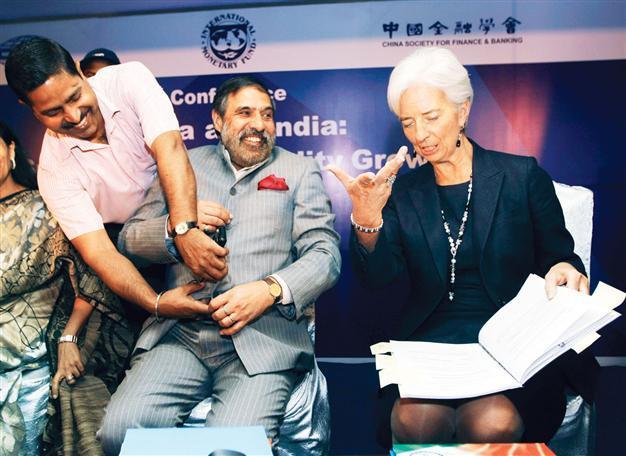IMF’s Lagarde says world back from financial abyss, weaknesses remain
NEW DELHI - Agence France-Presse

A microphone is adjusted on Indian Commerce Minister Anand Sharma (C) as IMF chief Lagarde (R) reacts during an IMF-supported conference in New Delhi.
International Monetary Fund (IMF) chief Christine Lagarde said yesterday the global economy has moved back from the “abyss” but that there were still serious weaknesses in the world financial system.Lagarde, visiting New Delhi for a two-day trip to attend a conference and meet leaders, said the world financial situation is not as grave as at the start of this year.
“We are further away from the abyss than we were three months ago,” the IMF managing director told a panel discussion.
‘Areas to attack’
Lagarde said steps by the European Central Bank and some European countries had helped stabilize the overall situation, but there were still areas “that need to be attacked with vigor,” such as shoring up financial institutions.
“Financial institutions were high contagion agents for this crisis -- this tells us where reforms have to focus. Financial institutions have to be agents for growth, not a threat to growth,” she said.
The global financial crisis has been a “huge catalyst” to get political leaders to take politically unpopular measures to restore economic health, she said.
Most European Union nations agreed in January to a treaty that will require governments to introduce laws on balanced budgets and sanctions on countries that violate deficit rules.
“Crisis was a major agent of change, but you don’t want to have to go there,” Lagarde said.
Call for social welfare
For emerging market giant India she said priorities had to be the development of its dilapidated ports, airports and other infrastructure in order to remove bottlenecks to economic growth and narrowing its ballooning fiscal deficit.
And she added that export-led China needed to improve its social safety net to spur greater domestic spending and bolster growth.
The Chinese must develop a social welfare system “that does not make them feel they have to save as much as they do so that they consume”, she said.
















